- Home
- Natalie Babbitt
Tuck Everlasting Page 2
Tuck Everlasting Read online
Page 2
The man answered neither of these questions. Instead, he said, “This young lady tells me you’ve lived here for a long time, so I thought you would probably know everyone who comes and goes.”
The old woman shook her head. “I don’t know everyone,” she said, “nor do I want to. And I don’t stand outside in the dark discussing such a thing with strangers. Neither does Winifred. So…”
And then she paused. For, through the twilight sounds of crickets and sighing trees, a faint, surprising wisp of music came floating to them, and all three turned toward it, toward the wood. It was a tinkling little melody, and in a few moments it stopped.
“My stars!” said Winnie’s grandmother, her eyes round. “I do believe it’s come again, after all these years!” She pressed her wrinkled hands together, forgetting the man in the yellow suit. “Did you hear that, Winifred? That’s it! That’s the elf music I told you about. Why, it’s been ages since I heard it last. And this is the first time you’ve ever heard it, isn’t it? Wait till we tell your father!” And she seized Winnie’s hand and turned to go back into the cottage.
“Wait!” said the man at the gate. He had stiffened, and his voice was eager. “You’ve heard that music before, you say?”
But, before he could get an answer, it began again and they all stopped to listen. This time it tinkled its way faintly through the little melody three times before it faded.
“It sounds like a music box,” said Winnie when it was over.
“Nonsense. It’s elves!” crowed her grandmother excitedly. And then she said to the man at the gate, “You’ll have to excuse us now.” She shook the gate latch under his nose, to make sure it was locked, and then, taking Winnie by the hand once more, she marched up the path into the cottage, shutting the door firmly behind her.
But the man in the yellow suit stood tapping his foot in the road for a long time all alone, looking at the wood. The last stains of sunset had melted away, and the twilight died, too, as he stood there, though its remnants clung reluctantly to everything that was pale in color—pebbles, the dusty road, the figure of the man himself—turning them blue and blurry.
Then the moon rose. The man came to himself and sighed. His expression was one of intense satisfaction. He put on his hat, and in the moonlight his long fingers were graceful and very white. Then he turned and disappeared down the shadowy road, and as he went he whistled, very softly, the tinkling little melody from the wood.
5
Winnie woke early next morning. The sun was only just opening its own eye on the eastern horizon and the cottage was full of silence. But she realized that sometime during the night she had made up her mind: she would not run away today. “Where would I go, anyway?” she asked herself. “There’s nowhere else I really want to be.” But in another part of her head, the dark part where her oldest fears were housed, she knew there was another sort of reason for staying at home: she was afraid to go away alone.
It was one thing to talk about being by yourself, doing important things, but quite another when the opportunity arose. The characters in the stories she read always seemed to go off without a thought or care, but in real life—well, the world was a dangerous place. People were always telling her so. And she would not be able to manage without protection. They were always telling her that, too. No one ever said precisely what it was that she would not be able to manage. But she did not need to ask. Her own imagination supplied the horrors.
Still, it was galling, this having to admit she was afraid. And when she remembered the toad, she felt even more disheartened. What if the toad should be out by the fence again today? What if he should laugh at her secretly and think she was a coward?
Well, anyway, she could at least slip out, right now, she decided, and go into the wood. To see if she could discover what had really made the music the night before. That would be something, anyway. She did not allow herself to consider the idea that making a difference in the world might require a bolder venture. She merely told herself consolingly, “Of course, while I’m in the wood, if I decide never to come back, well then, that will be that.” She was able to believe in this because she needed to; and, believing, was her own true, promising friend once more.
It was another heavy morning, already hot and breathless, but in the wood the air was cooler and smelled agreeably damp. Winnie had been no more than two slow minutes walking timidly under the interlacing branches when she wondered why she had never come here before. “Why, it’s nice!” she thought with great surprise.
For the wood was full of light, entirely different from the light she was used to. It was green and amber and alive, quivering in splotches on the padded ground, fanning into sturdy stripes between the tree trunks. There were little flowers she did not recognize, white and palest blue; and endless, tangled vines; and here and there a fallen log, half rotted but soft with patches of sweet green-velvet moss.
And there were creatures everywhere. The air fairly hummed with their daybreak activity: beetles and birds and squirrels and ants, and countless other things unseen, all gentle and self-absorbed and not in the least alarming. There was even, she saw with satisfaction, the toad. It was squatting on a low stump and she might not have noticed it, for it looked more like a mushroom than a living creature sitting there. As she came abreast of it, however, it blinked, and the movement gave it away.
“See?” she exclaimed. “I told you I’d be here first thing in the morning.”
The toad blinked again and nodded. Or perhaps it was only swallowing a fly. But then it nudged itself off the edge of the stump and vanished in the underbrush.
“It must have been watching for me,” said Winnie to herself, and was very glad she had come.
She wandered for a long time, looking at everything, listening to everything, proud to forget the tight, pruned world outside, humming a little now, trying to remember the pattern of the melody she had heard the night before. And then, up ahead, in a place where the light seemed brighter and the ground somewhat more open, something moved.
Winnie stopped abruptly and crouched down. “If it’s really elves,” she thought, “I can have a look at them.” And, though her instinct was to turn and run, she was pleased to discover that her curiosity was stronger. She began to creep forward. She would go just close enough, she told herself. Just close enough to see. And then she would turn and run. But when she came near, up behind a sheltering tree trunk, and peered around it, her mouth dropped open and all thought of running melted away.
There was a clearing directly in front of her, at the center of which an enormous tree thrust up, its thick roots rumpling the ground ten feet around in every direction. Sitting relaxed with his back against the trunk was a boy, almost a man. And he seemed so glorious to Winnie that she lost her heart at once.
He was thin and sunburned, this wonderful boy, with a thick mop of curly brown hair, and he wore his battered trousers and loose, grubby shirt with as much self-assurance as if they were silk and satin. A pair of green suspenders, more decorative than useful, gave the finishing touch, for he was shoeless and there was a twig tucked between the toes of one foot. He waved the twig idly as he sat there, his face turned up to gaze at the branches far above him. The golden morning light seemed to glow all around him, while brighter patches fell, now on his lean, brown hands, now on his hair and face, as the leaves stirred over his head.
Then he rubbed an ear carelessly, yawned, and stretched. Shifting his position, he turned his attention to a little pile of pebbles next to him. As Winnie watched, scarcely breathing, he moved the pile carefully to one side, pebble by pebble. Beneath the pile, the ground was shiny wet. The boy lifted a final stone and Winnie saw a low spurt of water, arching up and returning, like a fountain, into the ground. He bent and put his lips to the spurt, drinking noiselessly, and then he sat up again and drew his shirt sleeve across his mouth. As he did this, he turned his face in her direction—and their eyes met.
For a long moment they looked at each
other in silence, the boy with his arm still raised to his mouth. Neither of them moved. At last his arm fell to his side. “You may as well come out,” he said, with a frown.
Winnie stood up, embarrassed and, because of that, resentful. “I didn’t mean to watch you,” she protested as she stepped into the clearing. “I didn’t know anyone would be here.”
The boy eyed her as she came forward. “What’re you doing here?” he asked her sternly.
“It’s my wood,” said Winnie, surprised by the question. “I can come here whenever I want to. At least, I was never here before, but I could have come, anytime.”
“Oh,” said the boy, relaxing a little. “You’re one of the Fosters, then.”
“I’m Winnie,” she said. “Who are you?”
“I’m Jesse Tuck,” he answered. “How do.” And he put out a hand.
Winnie took his hand, staring at him. He was even more beautiful up close. “Do you live nearby?” she managed at last, letting go of his hand reluctantly. “I never saw you before. Do you come here a lot? No one’s supposed to. It’s our wood.” Then she added quickly, “It’s all right, though, if you come here. I mean, it’s all right with me.”
The boy grinned. “No, I don’t live nearby, and no, I don’t come here often. Just passing through. And thanks, I’m glad it’s all right with you.”
“That’s good,” said Winnie irrelevantly. She stepped back and sat down primly a short distance from him. “How old are you, anyway?” she asked, squinting at him.
There was a pause. At last he said, “Why do you want to know?”
“I just wondered,” said Winnie.
“All right. I’m one hundred and four years old,” he told her solemnly.
“No, I mean really,” she persisted.
“Well then,” he said, “if you must know, I’m seventeen.”
“Seventeen?”
“That’s right.”
“Oh,” said Winnie hopelessly. “Seventeen. That’s old.”
“You have no idea,” he agreed with a nod.
Winnie had the feeling he was laughing at her, but decided it was a nice kind of laughing. “Are you married?” she asked next.
This time he laughed out loud. “No, I’m not married. Are you?”
Now it was Winnie’s turn to laugh. “Of course not,” she said. “I’m only ten. But I’ll be eleven pretty soon.”
“And then you’ll get married,” he suggested.
Winnie laughed again, her head on one side, admiring him. And then she pointed to the spurt of water. “Is that good to drink?” she asked. “I’m thirsty.”
Jesse Tuck’s face was instantly serious. “Oh, that. No—no, it’s not,” he said quickly. “You mustn’t drink from it. Comes right up out of the ground. Probably pretty dirty.” And he began to pile the pebbles over it again.
“But you drank some,” Winnie reminded him.
“Oh. Did you see that?” He looked at her anxiously. “Well, me, I’ll drink anything. I mean, I’m used to it. It wouldn’t be good for you, though.”
“Why not?” said Winnie. She stood up. “It’s mine, anyway, if it’s in the wood. I want some. I’m about dry as dust.” And she went to where he sat, and knelt down beside the pile of pebbles.
“Believe me, Winnie Foster,” said Jesse, “it would be terrible for you if you drank any of this water. Just terrible. I can’t let you.”
“Well, I still don’t see why not,” said Winnie plaintively. “I’m getting thirstier every minute. If it didn’t hurt you, it won’t hurt me. If my papa was here, he’d let me have some.”
“You’re not going to tell him about it, are you?” said Jesse. His face had gone very pale under its sunburn. He stood up and put a bare foot firmly on the pile of pebbles. “I knew this would happen sooner or later. Now what am I going to do?”
As he said this, there was a crashing sound among the trees and a voice called, “Jesse?”
“Thank goodness!” said Jesse, blowing out his cheeks in relief. “Here comes Ma and Miles. They’ll know what to do.”
And sure enough, a big, comfortable-looking woman appeared, leading a fat old horse, and at her side was a young man almost as beautiful as Jesse. It was Mae Tuck with her other son, Jesse’s older brother. And at once, when she saw the two of them, Jesse with his foot on the pile of pebbles and Winnie on her knees beside him, she seemed to understand. Her hand flew to her bosom, grasping at the old brooch that fastened her shawl, and her face went bleak. “Well, boys,” she said, “here it is. The worst is happening at last.”
6
Afterward, when she thought about it, it seemed to Winnie that the next few minutes were only a blur. First she was kneeling on the ground, insisting on a drink from the spring, and the next thing she knew, she was seized and swung through the air, open-mouthed, and found herself straddling the bouncing back of the fat old horse, with Miles and Jesse trotting along on either side, while Mae ran puffing ahead, dragging on the bridle.
Winnie had often been haunted by visions of what it would be like to be kidnapped. But none of her visions had been like this, with her kidnappers just as alarmed as she was herself. She had always pictured a troupe of burly men with long black moustaches who would tumble her into a blanket and bear her off like a sack of potatoes while she pleaded for mercy. But, instead, it was they, Mae Tuck and Miles and Jesse, who were pleading.
“Please, child…dear, dear child…don’t you be scared.” This was Mae, trying to run and call back over her shoulder at the same time. “We…wouldn’t harm you…for the world.”
“If you’d…yelled or anything”—this was Jesse—“someone might’ve heard you and…that’s too risky.”
And Miles said, “We’ll explain it…soon as we’re far enough away.”
Winnie herself was speechless. She clung to the saddle and gave herself up to the astonishing fact that, though her heart was pounding and her backbone felt like a pipe full of cold running water, her head was fiercely calm. Disconnected thoughts presented themselves one by one, as if they had been waiting their turn in line. “So this is what it’s like to ride a horse—I was going to run away today anyway—what will they say when I’m not there for breakfast—I wish the toad could see me now—that woman is worried about me—Miles is taller than Jesse—I’d better duck if I don’t want this next branch to knock me off.”
They had come to the edge of the wood now, with no sign of slowing their rapid jog. The road, where it angled across the meadow, was just ahead, dazzling white in the open sunlight. And there, standing on the road, was the man from the night before, the man in the yellow suit, his black hat on his head.
Discovering him, seeing his surprise, and presented at once with choices, Winnie’s mind perversely went blank. Instead of crying out for help, she merely goggled at him as they fled past the spot where he stood. Mae Tuck was the only one who spoke, and the most she could offer was: “Teaching our little girl…how to ride!” Only then did it come to Winnie that she ought to shout, wave her arms, do something. But the man had fallen away behind by that time, and she was afraid to let go of the saddle, afraid to turn around, lest she fall off the horse. In another moment it was too late. They had sped up the hill and down its other side, and the opportunity was lost.
After another few minutes, the road led them to a place where, off to the left, a shallow stream looped near, with willows and sheltering, scrubby bushes. “Stop!” cried Mae. “We’ll stop here!” Miles and Jesse grabbed at the horse’s harness and he pulled up abruptly, nearly toppling Winnie off over his neck. “Lift the poor child down,” Mae gasped, her chest heaving. “We’ll go catch our breath by the water and try to put things straight before we go on.”
But the explanation, once they had stumbled to the banks of the stream, came hard. Mae seemed embarrassed, and Miles and Jesse fidgeted, glancing at their mother uneasily. No one knew how to begin. For her part, Winnie, now that the running was over, began to comprehend what was happening, a
nd with the comprehension her throat closed and her mouth went dry as paper. This was no vision. This was real. Strangers were taking her away; they might do anything; she might never see her mother again. And then, thinking of her mother, she saw herself as small, weak, and helpless, and she began to cry, suddenly, crushed as much by outrage as by shock.
Mae Tuck’s round face wrinkled in dismay. “Dear Lord, don’t cry! Please don’t cry, child!” she implored. “We’re not bad people, truly we’re not. We had to bring you away—you’ll see why in a minute—and we’ll take you back just as soon as we can. Tomorrow. I promise.”
When Mae said, “Tomorrow,” Winnie’s sobs turned to wails. Tomorrow! It was like being told she would be kept away forever. She wanted to go home now, at once, rush back to the safety of the fence and her mother’s voice from the window. Mae reached out to her, but she twisted away, her hands over her face, and gave herself up to weeping.
“This is awful!” said Jesse. “Can’t you do something, Ma? The poor little tad.”
“We ought to’ve had some better plan than this,” said Miles.
“That’s the truth,” said Mae helplessly. “The dear Lord knows there’s been time enough to think of one, and it had to happen sooner or later. We been plain bone lucky it hasn’t before now. But I never expected it’d be a child!” She reached distractedly into the pocket of her skirt and took out the music box and, without thinking, twisted the winding key with trembling fingers.
When the tinkling little melody began, Winnie’s sobbing slowed. She stood by the stream, her hands still over her face, and listened. Yes, it was the same music she had heard the night before. Somehow it calmed her. It was like a ribbon tying her to familiar things. She thought, “When I get home, I’ll tell Granny it wasn’t elf music after all.” She wiped her face as well as she could with her wet hands and turned to Mae. “That’s the music I heard last night,” she managed between recovering snuffles. “When I was out in my yard. My granny said it was elves.”

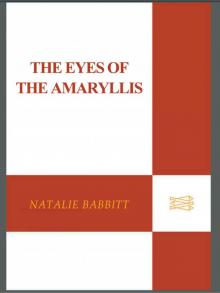 The Eyes of the Amaryllis
The Eyes of the Amaryllis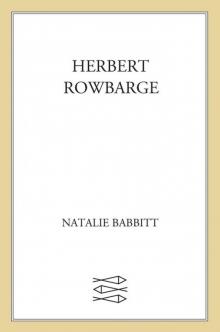 Herbert Rowbarge
Herbert Rowbarge The Search for Delicious
The Search for Delicious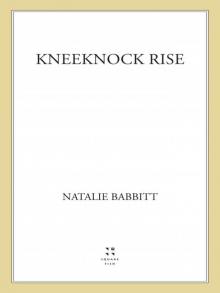 Kneeknock Rise
Kneeknock Rise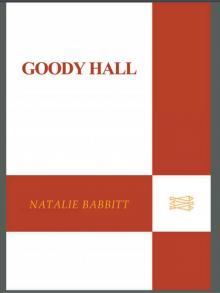 Goody Hall
Goody Hall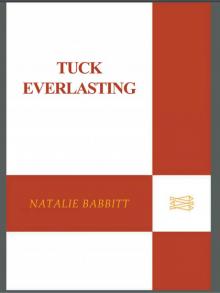 Tuck Everlasting
Tuck Everlasting The Devil's Storybook
The Devil's Storybook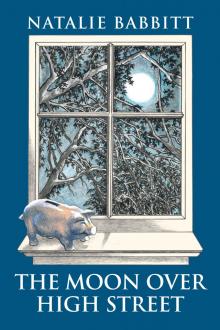 The Moon Over High Street
The Moon Over High Street Phoebe's Revolt
Phoebe's Revolt Barking with the Big Dogs
Barking with the Big Dogs The Devil's Storybooks
The Devil's Storybooks